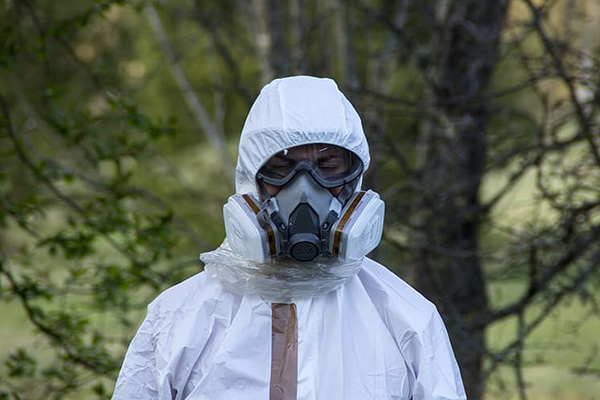It has been a popular debate as to whether glyphosate, a chemical found in Roundup, puts our health at risk. It’s been a growing topic in Sebastian, Florida.
In January 2020, after receiving and considering public comments about glyphosate, the EPA released an interim decision for registration review.
“EPA continues to find that there are no risks of concern to human health when glyphosate is used in accordance with its current label. EPA also found that glyphosate is unlikely to be a human carcinogen. EPA is requiring management measures to help farmers target pesticide sprays to intended pests, protect pollinators, and reduce the problem of weeds becoming resistant to glyphosate,” according to the EPA’s statement.
The important part of the EPA’s statement is “glyphosate is used in accordance with its current label.”
There are many chemicals sold that can cause concern for human health if not used as directed.
Scientists working with the EPA performed an independent evaluation of available data for glyphosate and found:
- No risks of concern to human health from current uses of glyphosate. Glyphosate products used according to label directions do not result in risks to children or adults.
- No indication that children are more sensitive to glyphosate. After evaluating numerous studies from a variety of sources, the Agency found no indication that children are more sensitive to glyphosate from in utero or postnatal exposure. As part of the human health risk assessment, the Agency evaluated all populations, including infants, children, and women of child-bearing age, and found no risks of concern from ingesting food with glyphosate residues. EPA also found no risks of concern for children entering or playing on residential areas treated with glyphosate.
- No evidence that glyphosate causes cancer in humans. The Agency concluded that glyphosate is not likely to be carcinogenic to humans. EPA considered a significantly more extensive and relevant dataset than the International Agency on the Research for Cancer (IARC). EPA’s database includes studies submitted to support registration of glyphosate and studies EPA identified in the open literature.
- EPA considered a significantly more extensive and relevant dataset than the International Agency on the Research for Cancer (IARC). EPA’s database includes studies submitted to support registration of glyphosate and studies EPA identified in the open literature. For instance, IARC only considered eight animal carcinogenicity studies, while EPA used 15 acceptable carcinogenicity studies. EPA does not agree with IARC’s conclusion that glyphosate is “probably carcinogenic to humans.”
- EPA’s cancer classification is consistent with other international expert panels and regulatory authorities, including the Canadian Pest Management Regulatory Agency, Australian Pesticide, and Veterinary Medicines Authority, European Food Safety Authority, European Chemicals Agency, German Federal Institute for Occupational Safety and Health, New Zealand Environmental Protection Authority, and the Food Safety Commission of Japan and the Joint Food and Agriculture Organization/World Health Organization (FAO/WHO) Meeting on Pesticide Residues (JMPR). For more information, read the Revised Glyphosate Issue Paper: Evaluation of Carcinogenic Potential, which comes as a PDF file.
- No indication that glyphosate is an endocrine disruptor. Glyphosate has undergone Tier I screening under EPA’s Endocrine Disruptor Screening Program. Based on all available information, EPA concluded, using a weight-of-evidence approach, that the existing data do not indicate that glyphosate has the potential to interact with the estrogen, androgen, or thyroid signaling pathways. The screening program did not indicate the need for additional testing for glyphosate.
The other concerns are about crops and glyphosate found in our foods.
“Before allowing the use of a pesticide on food crops, EPA sets a tolerance or limit on how much pesticide residue can legally remain on food and feed products, or commodities. The complete listing of tolerances for glyphosate can be found in 40 CFR § 180.364. If residues are found above the established tolerance level, the commodity will be subject to seizure by the government,” the EPA stated.
“Due to its widespread use, trace amounts of glyphosate residues may be found in various fresh fruits, vegetables, cereals, and other food and beverage commodities. However, these trace amounts are not of concern for the consumer. The EPA conducted a highly conservative dietary risk assessment for glyphosate that evaluated all populations, including infants, children, and women of child-bearing age. EPA assumed that 100 percent of all registered crops were treated with glyphosate, that residues were at the tolerance level for each crop, and that residues in drinking water were from the direct application of glyphosate to water. These assumptions would lead to much higher estimated levels of exposure than would be expected to occur with actual use. The resulting conservative estimates of dietary exposure were not of concern,” the EPA added.
Now, on the other side of the argument are people who say our own government isn’t telling us the truth about glyphosate. They claim it’s all about money and power. The chemical is found in 90% of food products, including honey.
Several cities in different states have already banned glyphosate. The City of Tuscon has a city policy that requires an organics-first weed control on city property. But, some of the organic sprays can cause health problems and do more damage than good.
Several countries such as Thailand, India, Vietnam, Portugal, Spain, Kuwait, Saudi Arabia, Bermuda, Austria, Belgium, Czech Republic, Greece, Denmark, France, Italy, and the Netherlands have banned glyphosate.
Sebastian residents have been concerned about glyphosate in Roundup for quite some time now.
The City Council and the City Manager have been working on finding a solution long before the three new council members ran on the issue. The council was already working on solutions without placing a full ban. Now we’ve seen the damage a complete ban can cause without having a new solution already in place.
Mayor Ed Dodd and City Manager Paul Carlisle have done a great job organizing the Integrated Pest Management workshops and testing alternatives. The City of Sebastian is moving forward, but the new alternatives may increase taxes for Sebastian residents. It does come with a cost. Carlisle is testing a product called WOW in our parks, which works like Roundup without glyphosate.
Mayor Dodd also spearheads the Sustainable Sebastian Initiative, which is launching on Earth Day. The members of the Natural Resources Board are also doing a great job with this initiative. We have plenty of projects going on in the city to help our environment.
There are truly a lot of great things happening in Sebastian, and people do care about our environment. The argument on whether glyphosate causes health problems will be ongoing even after we stop its use in our public parks.
We encourage our readers to read the latest Letter to the Editor about glyphosate and Sebastian Pest Management Decisions. It’s probably the best explanation that’s been given thus far. It comes from a local man who works in the industry.







